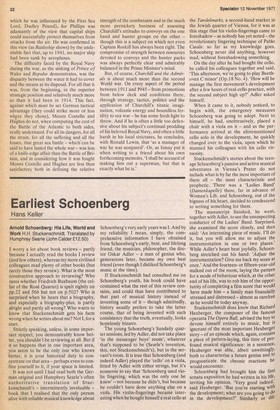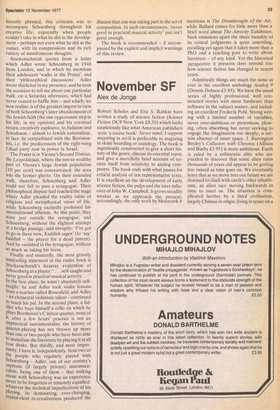Earliest Schoenberg
Hans Keller
Arnold Schoenberg: His Life, World and Work H.H. Stuckenschmidt. Translated by Humphrey Searle (John Calder £12.50) I worry a lot about book reviews — partly because I actually read the books I review (and few others), whereas my more civilised colleagues read plenty of other books (but rarely those they review). What is the most constructive approach to reviewing? Who cares whether Friedrich Buxbaum (the cellist of the Rose Quartet) is spelt rightly on pp.22 and 566 but not on p.502? Who is surprised when he hears that a biography, and especially a biography-plus, is partly alright and partly all wrong? Who wants to know that Stuckenschmidt gets his facts wrong when he writes about me? Not!, for a start.
Strictly speaking, unless, in some important respect, you demonstrably know better, you shouldn't be reviewing at all. But if it so happens that in one important area, you seem to be the only One who knows better, it is your historical duty to concentrate on that area — perhaps even to confine yourself to it, if your space is limited.
It was not until I had read both the German original and Humphrey Searle's often authoritative translation of Stuckenschmidt's — intermittently invaluable — book that I realised that the only person alive with reliable musical knowledge about Schoenberg's very early years was I. And by my reliability I mean, simply, the comprehensive information I have obtained from Schoenberg's early, best, and lifelong friend, the musician, philosopher, the doctor Oskar Adler — a man of genius who, generations later, became my own best friend (even though I disliked Schoenberg's music at the time).
If Stuckenschmidt had consulted me on Schoenberg's youth, his book could have contained what the rest of this review contains, and could thus have contributed to that part of musical history instead of inventing some of it — though admittedly, history usually prefers to take the latter course, that of being invented with such consistency that the truth, eventually, looks hopelessly bizarre.
The young Schoenberg's Sundaily quartet sessions, led by Adler, did not take place 'in the messenger boys' room', whatever that's supposed to be (Searle's invention, this, not Stuckenschmidt's), but in the servant's room. It is true that Schoenberg (and indeed Adler) played the 'cello' on a viola, fitted by Adler with zither strings, but it's nonsense to say that 'Schoenberg used violin fingering, which was the only one he knew' — not because he didn't, but because he couldn't have done anything else on a viola. His violin-fingerings became interesting when he bought himself a real cello at the Tandelmarkt, a second-hand market in the Jewish quarter of Vienna, for it was at this stage that his violin-fingerings came to foreshadow — as nobody has yet noted — the revolutionary fingering technique of Pablo Casals: so far as my knowledge goes, Schoenberg never did anything, however mad, without foreshadowing something.
On the day after he had bought the cello, he called his colleagues together and said, 'This afternoon, we're going to play Beethoven C minor' (0p.18 No. 4). 'How will he manage the first movement's development after a few hours of real-cello practice, with the second subject high up?' Adler asked himself.
When it came to it, nobody noticed, to begin with, the emergency measures Schoenberg was going to adopt. Next to himself, he had, unobtrusively, placed a chair with a viola on it — and as the performance arrived at the aforementioned cello solo in the development, he quickly changed over to the viola, upon which he stunned his colleagues with his cello virtuosity.
Stuckenschmidt's stories about the teenage Schoenberg's passive and active musical adventures in Vienna's Prater do not include what is by far the most important of them all — the most characteristic and prophetic. There was a 'Ladies Band' (Darnenkapelle) there, far in advance of Women's Lib, and Schoenberg, out of the bigness of his, heart, decided to condescend to writing something for them.
The manuscript finished, he went, together with Adler, to see the unsuspecting conductor of the Ladies' Band. Surprised, she examined the score closely, and then said: 'An interesting piece of music. I'll do it, but you will allow me to adjust the instrumentation in one or two places.' While Adler's heart beat joyfully, Schoenberg stretched out his hand: 'Adjust the instrumentation? Give me back my scare at once.' And the fourteenor fifteen-year-old stalked out of the room, laying the pattern for a mode of behaviour which, at the other end of his life, was to rob him of the opportunity of completing a film score that would have made him — a family man financially stressed and distressed — almost as carefree as he would be today anyway. Stuckenschmidt does know that Richard Heuberger, the composer of the famous operatta The Opera Ball, advised the boy to devote himself entirely to music, but Is ignorant of the most important Heubergef story — of an episode which, again, contains a piece of pattern-laying, this time of profound musical significance: in a sentence, Heuberger was able, albeit unwittinglY, both to characterise a future genius and to prognosticate the chronic reactions he would encounter.
Schoenberg had brought him the first sonata exposition he had written in his life: inviting his opinion. 'Very good indeed, said Heuberger. 'But you're starting with the development; what are you going to do in the development?' Similarly or dd.' ferently phrased, this criticism was to accompany Schoenberg throughout his creative life, especially when people couldn't take in what he did in the development — perhaps not even what he did at the outset, with its compressions and its rich variety of simultaneous thoughts.
Stuckenschmidt quotes from a letter which Adler wrote Schoenberg in 1948 from London, and in which he mentions their adolescent 'walks in the Prater', and their 'philosophical discussions'. Adler wrote this letter in my presence, and he took the occasion to tell me about one particular walk, on a Saturday afternoon, which had never ceased to baffle him — and which, we now realise, is of the greatest import in view of both Schoenberg's later abandonment of the Jewish faith (the one opportunist step in his life, in my opinion) and his eventual return, creatively explosive, to Judaism and Jewishness — almost to Jewish nationalism, in fact: he sympathised with the Revisionists, i.e. the predecessors of the right-wing Likud party now in power in Israel.
The Prater is in Vienna's Second District, the Leopoldstadt, where the not so wealthy part of Vienna's large Jewish population (10 per cent) was concentrated: the area was the former ghetto. On their extended walk, therefore, Schoenberg and Adler could not fail to pass a synagogue. Their Philosophical dispute had reached the stage Where Adler pleaded the reality value of religious and metaphysical views of life, While Schoenberg excitedly professed his unconditional atheism. At this point, they were just outside the synagogue, and Schoenberg, without the slightest attempt at a bridge passage, said abruptly: 'I've got to go in there now, Kaddish sagen" (to 'say' kaddish — the prayer for a dead parent). And he vanished in the synagogue, without SO much as taking his leave.
.Finally and musically, the most gravely misleading statement in the entire book is Stuckenschmidt's hearsay evaluation of Schoenberg as a player:'. . self-taught and never good in practical musical activity. In the first place, he wasn't absolutely selftaught: he and Adler took violin lessons from a teacher called Rosenfeld, and Adler — an elemental violinistic talent — continued to teach his pal. In the second place, a fiddler who buys himself a cello on which he Plays Beethoven's C minor quartet, most of it, after a few hours' practice is not an unpractical instrumentalist: the history of quartet-playing has not thrown up more than one or two people who have been able to assimilate the literature by playing it at all four desks. But thirdly, and most importantly, I have it, independently, from two of the people who regularly played with Schoenberg — Adler, one of our century's supreme (if largely private) instrumentalists, being one of them — that making music with Schoenberg was an experience never to be forgotten or remotely equalled: whatever the technical imperfections of his Playing, its dominating, ever-changing, crystal-clear re-creativeness produced the illusion that one was taking part in the act of composition. In such circumstances, 'never good in practical musical activity' just isn't good enough.
The book is recommended — if accompanied by the explicit and implicit warnings of this review.



































 Previous page
Previous page